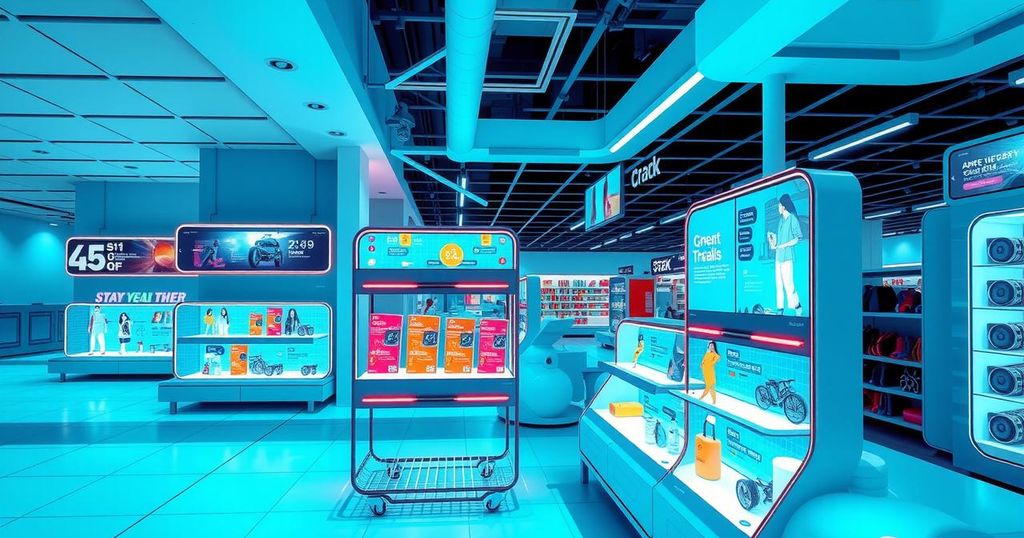Retail Tech Innovations for 2025: Empowering Businesses with AI Agents
Retail technology is rapidly evolving with AI innovations transforming the shopping experience. Santa Clarita is strategically positioned for these changes, having filled significant retail space and maintaining affordable business costs. Key trends such as AI agents, augmented reality, and sustainable tech are prominent for 2025, empowering local retailers to enhance operations and customer experiences while fostering innovation.
The retail landscape is shifting dramatically, driven by innovations in technology and the introduction of AI tools. Walk into a store today, and you’ll notice self-checkouts, digital signage, and apps transforming the shopper experience. But beneath this visible change, AI is really the silent player, redefining operations and possibilities in the retail sector.
Santa Clarita finds itself in a prime position for this evolution. Ranked 22nd among California cities in retail volume back in 2018, the city has continued to expand, with nearly all 150,000 square feet of new retail space filled by early 2024, according to illi Commercial. Plus, it boasts an affordable environment for business compared to other parts of LA County, making it an ideal testing ground for new technologies like AI-powered customer service and smart inventory systems.
Shoppers today crave speed, personalization, and convenience. Thus, store owners must adapt or risk falling behind. Enter omnichannel retail—AI plays a crucial role in making this multi-platform shopping experience work seamlessly.
Looking ahead to 2025, the technology that will shape retail isn’t about chasing flashy trends. It’s all about creating more compassionate, seamless, and sophisticated customer experiences. Here are six key trends paving the way:
1. AI Agents: These tools smoothly weave into everyday retail operations, helping to manage customer inquiries and alerting staff to low inventory. This shift allows teams to focus on more complex tasks.
2. Augmented Reality (AR): No longer just a novel technology, AR is enhancing shopping. Brands from IKEA to Sephora are leveraging virtual try-ons to boost customer confidence and reduce return rates, also aiding staff with real-time merchandising setups.
3. Cashierless Checkout: The demand for swift, self-service checkouts is surging. Options like mobile scan-and-go or RFID systems address the need to eliminate long lines, even in smaller stores.
4. Real-time Inventory Management: Technologies like smart shelves and RFID tags are enabling retailers to monitor stock levels instantly. This speeds up restocking and minimizes lost sales, ultimately controlling shrinkage better.
5. Targeted Marketing with Data: In what we’re calling an age of hyper-personalization, AI analyzes shopper habits to send tailored ads, making marketing more respectful of consumer privacy while boosting conversions.
6. Sustainable Technology: More retailers are integrating eco-friendly technologies. From AI demand forecasting that minimizes waste to energy-efficient systems, sustainability is turning into a competitive business strategy rather than a mere obligation.
AI agents are particularly fascinating. They go beyond mere software; they learn, adapt, and assist in real-time with customer service, sales, and inventory management. The added perk? They keep advancing without needing breaks.
Here’s the impact locally: AI helps store owners manage workloads more efficiently, freeing them from repetitive tasks. Imagine a boutique leveraging AI to figure out seasonal sales trends, or a grocery store predicting when to restock based on previous shopping data. Even implementing a chatbot can significantly boost productivity.
The path to incorporate AI doesn’t have to be daunting. Businesses can start small, experiment, and expand as they validate their strategies. This opens doors for local tech startups to create market-driven solutions addressing key challenges faced by retailers. Instead of aiming to become the next big Amazon, the objective can simply be to provide genuine solutions that improve everyday business operations.
Santa Clarita’s rich civic life thrives on innovation. The city has a reputation for supporting local businesses eager to experiment with new ideas. Here, it’s an exciting opportunity to consider personalized product recommendations, restocking assistants, and smart customer services.
AI consulting services can guide businesses to effectively implement these innovations by helping map out available solutions and investing wisely in technology. Rather than chasing trends, the focus should be on enhancing relevance and client responsiveness.
With the momentum already building, Santa Clarita has a chance not just to adapt but to be a leader in this new retail era. With strategic steps, it can set the standard for others to follow.
In summary, Santa Clarita stands poised as a beacon of innovation in retail technology. With a focus on AI-powered tools and sustainable practices, the city can enhance shopping experiences while helping local businesses thrive. Rather than simply adapting to trends, retailers here can lead the charge in creating a more efficient, personalized, and responsible retail environment, benefitting both shops and their communities.
Original Source: www.hometownstation.com




